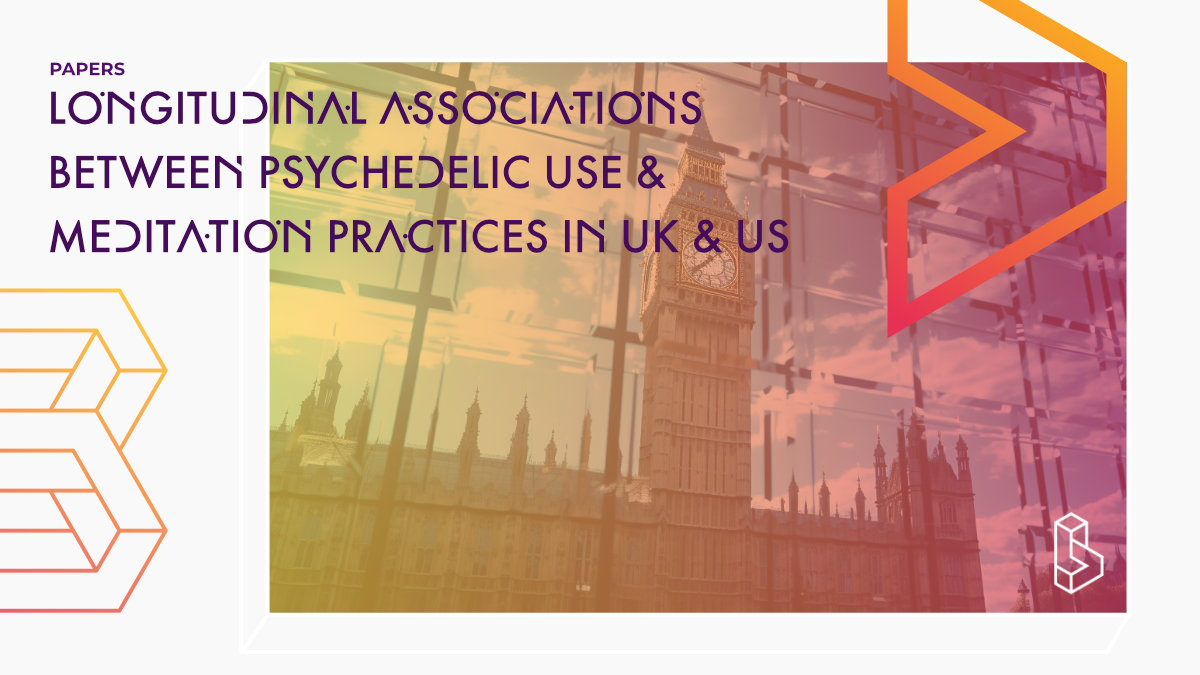This longitudinal observational study (n=9,732) aimed to investigate potential associations between self-reported psychedelic use and meditation practice in the US and UK adult populations. The study found that psychedelic use during a 2-month period was associated with increased engagement in mindfulness meditation practice, and the subjective experience of insight during psychedelic use was linked to greater involvement in mindfulness and loving-kindness or compassion meditation. Additionally, the research indicated that baseline engagement in loving-kindness or compassion meditation was associated with reduced severity of challenging experiences during psychedelic use.
Abstract of Longitudinal associations between psychedelic use and meditation practices in the United States and the United Kingdom
“Background: Previous research has proposed that there may be potential synergies between psychedelic and meditation interventions, but there are still knowledge gaps that merit further investigation.
Methods: Using a longitudinal observational research design with samples representative of the US and UK adult population with regard to sex, age, and ethnicity (N = 9732), we investigated potential associations between self-reported psychedelic use and meditation practice.
Results: The follow-up survey was completed by 7667 respondents (79% retention rate), with 100 respondents reporting psychedelic use during the 2-month study period (1.3% of follow-up respondents). In covariate-adjusted regression models, psychedelic use during the study period was associated with greater increases in the number of days of mindfulness meditation practice in the past week (B = 0.40, p = 0.004). Among those who reported psychedelic use during the study period, covariate-adjusted regression models revealed that the subjective experience of insight during respondents’ most intense psychedelic experience in that period was also associated with greater increases in the number of days of mindfulness and loving-kindness or compassion meditation practice in the past week (B = 0.42, p = 0.021; B = 0.38, p = 0.017). Notably, more days of loving-kindness or compassion meditation practice in the past week at baseline was associated with less severe subjective feelings of death or dying during respondents’ most intense psychedelic experience in the study period (B = −0.29, p = 0.037).
Conclusions: Psychedelic use might lead to greater engagement with meditation practices such as mindfulness meditation, while meditation practices such as loving-kindness or compassion medication might buffer against certain challenging experiences associated with psychedelic use.”
Authors: Otto Simonsson, Walter Osika, Cecilia U. D. Stenfors, Simon B. Goldberg, Ludwig Honk & Peter S. Hendricks
Summary of Longitudinal associations between psychedelic use and meditation practices in the United States and the United Kingdom
An emerging body of research on loving-kindness meditation and other similar practices involves cultivating positive emotions toward oneself and others. These practices positively affect mental health, but many psychological barriers can come in the way of regular meditation practice.
Recent research suggests that psychedelics may support meditation practice, and psilocybin administration may increase meditation depth among experienced meditators who participate in a mindfulness meditation retreat. No association was observed between lifetime psychedelic use and number of days of loving-kindness or compassion meditation practice.
Other research indicates that meditation practice might influence the acute psychedelic experience. For instance, trying to calm the mind was the most commonly reported helpful intervention during respondents’ most challenging, difficult, or distressing experience using a psychedelic.
Find this paper
https://doi.org/10.1017/S0033291723003082
Open Access | Google Scholar | Backup | 🕊
Cite this paper (APA)
Simonsson, O., Osika, W., Stenfors, C., Goldberg, S., Honk, L., & Hendricks, P. (2023). Longitudinal associations between psychedelic use and meditation practices in the United States and the United Kingdom. Psychological Medicine, 1-7. doi:10.1017/S0033291723003082
Study details
Compounds studied
Psilocybin
Topics studied
Population Surveys
Study characteristics
Longitudinal
Survey
Participants
9732
Humans
Linked Research Papers
Notable research papers that build on or are influenced by this paper
Classic Psychedelic Use and Current Meditation PracticeThis survey study (n=2822) finds a correlation between lifetime classical psychedelic use (n=613) and a higher frequency of current mindfulness meditation (but not compassion meditation) practice. When analysing psychological insight (an aspect of the acute psychedelic experience), a correlation with both types of meditation was found.

